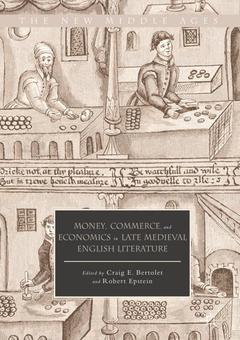Description
Money, Commerce, and Economics in Late Medieval English Literature, Softcover reprint of the original 1st ed. 2018
The New Middle Ages Series
Language: English
Subjects for Money, Commerce, and Economics in Late Medieval English...:
Keywords
late medieval economics; modern economics in medieval context; Marxist historiography of the medieval period; commercial economy of 14th-century England; gift-exchange in medieval England; economics of salvation in Medieval literature; Judas in medieval drama and poetry; Merchant of Venice; The Southern Passion; Medieval devotional literature and economics; Wynnere and Wastoure; economics and medieval collectivism; medieval antimercantilism; Dives and Pauper; Franciscan theology and social inequity; social strata in 14th century England; Piers Plowman; Karl Polanyi; the medieval free-market; economics in Chaucer
Publication date: 02-2018
Support: Print on demand
Publication date: 06-2019
185 p. · 14.8x21 cm · Paperback
Description
/li>Contents
/li>Biography
/li>Comment
/li>
This is the first collection of essays dedicated to the topics of money and economics in the English literature of the late Middle Ages. These essays explore ways that late medieval economic thought informs contemporary English texts and apply modern modes of economic analysis to medieval literature. In so doing, they read the importance and influence of historical records of practices as aids to contextualizing these texts. They also apply recent modes of economic history as a means to understand the questions the texts ask about economics, trade, and money. Collectively, these papers argue that both medieval and modern economic thought are key to valuable historical contextualization of medieval literary texts, but that this criticism can be advanced only if we also recognize the specificity of the economic and social conditions of late-medieval England.
1 Introduction: "Greet press at market": Money Matters in Late Medieval English Literature.- 2 Judas and the Economics of Salvation in Medieval English Literature.- 3 “Whoso wele schal wyn, a wastour moste he fynde": Inter-reliant Economies and Social Capital in Wynnere and Wastoure.- 4 “The ryche man hatz more nede thanne the pore": Economics and Dependence in Dives and Pauper.- 5 Summoning Hunger: Polanyi, Piers Plowman, and the Labor Market.- 6 Demonic Ambiguity: Debt in the Friar-Summoner Sequence.- 7 Death is Money: Buying Trouble with the Pardoner.- 8: My Purse and My Person: "The Complaint of Chaucer to His Purse" and the Gender of Money.- 9 The Need for Economy: Poetic Identity and Trade in Gower’s Confessio Amantis.- 10: “Money Earned; Money Won": The Problem of Labor Pricing in Gower’s "Tale of the King and the Steward’s Wife".- 11 Crossing the Threshold: Geoffrey Chaucer, Adam Smith, and the Liminal Transactionalism of the Later Middle Ages.
Craig E. Bertolet is Professor of Medieval English Literature at Auburn University, USA. He is the author of Chaucer, Gower, Hoccleve, and the Commercial Practices of Late Fourteenth-Century London (2013) and articles and book chapters on the intersection between medieval culture and its literature. He is at work on a book concerning the crisis of money in late medieval English literature.
Robert Epstein is Professor of English at Fairfield University, USA. He is the author of Chaucer’s Gifts: Exchange and Value in the Canterbury Tales (forthcoming).Elucidates the complexity of economic thought animating medieval cultural production
Applies modern and emerging economic theories to medieval texts
Analyzes the specific economic and social conditions of late-medieval England
These books may interest you

A Handbook of Middle English Studies 143.22 €



